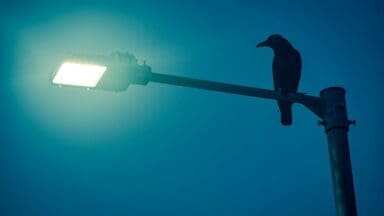
New research by the ecologists, Dr Brent Pease, Assistant Professor, Southern Illinois University and Neil Gilbert, Assistant Professor at Oklahoma State University has revealed that light pollution is making many birds sing nearly an hour longer at dawn or dusk.
Pease and Gilbert, set up an audio system and based submitted recordings submitted by bird enthusiasts to a popular species identification and mapping website, the research showed that birds in places with large amounts of light pollution were singing, on average, nearly an hour longer than their counterparts in darker places.
“We were shocked by our findings. Under the brightest night skies, a bird’s day is extended by nearly an hour,” said Pease. “I realised that I stumbled upon something really important for wildlife research. All of a sudden, we not only know where species are but how they are behaving 24/7.”
Not all birds responded in this way, but those with larger eyes showed a bigger response. Northern mocking birds and European goldfinches for example, all extended their day by more than average. Sparrows, which have smaller eyes, seemed less affected. Birds that nested in the open also tended to extend their singing times around artificial lights far more than ones that nest in cavities, which the researchers said could be because they are more sheltered from the glare of lights.
The system used by the researchers, BirdWeather pairs microphones with AI to identify some 6,000 species of birds based on their birdsong. Through this novel system, Pease and Gilbert managed to retrieve a huge planet-wide dataset containing 2.6 million hits on 583 different species of daytime (not nocturnal) birds in 7,824 locations between March 2023 and March 2024.
The researchers add that it’s still unclear if the extended singing time is helpful or harmful to birds. Birds may be more fatigued or stressed from the extra carousing, or it may be advantageous in terms of extra time to attract a mate or find food. What is clear is that these findings contribute to the growing body of evidence demonstrating how light pollution disrupts the natural light-dark cues and behaviour of birds and other animals.
Reference: Pease BS, Gilbert NA. Light pollution prolongs avian activity. Science. 2025 Aug 21;389(6762):818-821. doi: 10.1126/science.adv9472. Epub 2025 Aug 21. PMID: 40839731.

